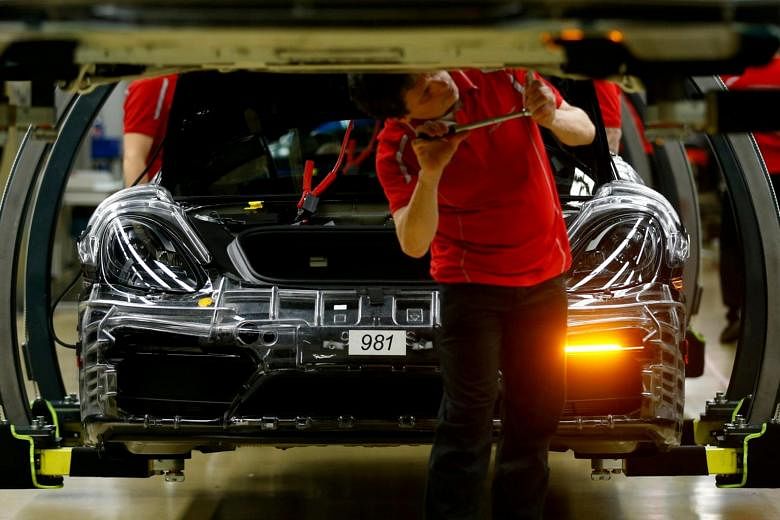DAVOS • The International Monetary Fund (IMF) yesterday cut its world economic growth forecasts for 2019 and 2020 because of weakness in Europe and some emerging markets, and said that failure to resolve trade tensions could further destabilise a slowing global economy.
In its second downgrade in three months, the global lender also cited a bigger-than-expected slowdown in China's economy and a possible "no deal" Brexit as risks to its outlook, saying that these could worsen turbulence in financial markets.
The IMF predicted the global economy to grow at 3.5 per cent in 2019 and 3.6 per cent in 2020, down 0.2 and 0.1 percentage point, respectively, from last October's forecasts.
The new forecasts, released ahead of this week's gathering of world leaders and business executives in the Swiss ski resort of Davos, show that policymakers may need to come up with plans to deal with an end to years of solid global growth.
"Risks to global growth tilt to the downside. An escalation of trade tensions beyond those already incorporated in the fore-cast remains a key source of risk to the outlook," the IMF said in an update to its World Economic Outlook report.
The downgrades reflected signs of weakness in Europe, with its export powerhouse Germany hurt by new fuel emission standards for cars and with Italy under market pressure due to Rome's recent budget stand-off with the European Union.
Growth in the euro zone is set to moderate from 1.8 per cent in 2018 to 1.6 per cent in 2019, 0.3 percentage point lower than projected three months ago, the IMF said.
The IMF also cut its 2019 growth forecast for developing countries to 4.5 per cent, down 0.2 percentage point from the previous projection and a slowdown from 4.7 per cent in 2018.
"Emerging market and developing economies have been tested by difficult external conditions over the past few months amid trade tensions, rising US interest rates, dollar appreciation, capital outflows and volatile oil prices," the IMF said.
The IMF maintained its US growth projections of 2.5 per cent this year and 1.8 per cent in 2020, pointing to continued strength in domestic demand.
It also kept its China growth forecast at 6.2 per cent in both 2019 and 2020, but said economic activity could miss expectations if trade tensions persist, even with state efforts to spur growth by boosting fiscal spending and bank lending.
Britain is expected to achieve 1.5 per cent growth this year, though there is uncertainty over the projection, which is based on the assumption of an orderly exit from the EU, the IMF said.
The IMF has stressed the need to address income inequality and reform the financial sector.
However, as growth momentum peaks and risks to the outlook rise, policymakers must now focus on policies to prevent further slowdowns, the IMF said.
Meanwhile, Oxfam has said that the world's 26 richest people own the same wealth as the poorest half of humanity, and urged governments to increase taxes on the wealthy to fight soaring inequality.
A new report from the charity, published yesterday ahead of the World Economic Forum in Davos, also found that billionaires around the world saw their combined fortunes grow by US$2.5 billion (S$3.4 billion) each day last year.
The world's richest man, Amazon chief executive officer Jeff Bezos, saw his fortune increase to US$112 billion last year. Oxfam said just 1 per cent of his wealth was equivalent to the entire health budget of Ethiopia, a country of 105 million people.
Meanwhile, the 3.8 billion people at the bottom of the scale saw their wealth decline by 11 per cent last year, Oxfam said, stressing that the growing gap between the rich and the poor was undermining the fight against poverty, damaging economies and fuelling public anger.
"People across the globe are angry and frustrated," Oxfam executive director Winnie Byanyima warned in a statement.
REUTERS, AGENCE FRANCE-PRESSE


